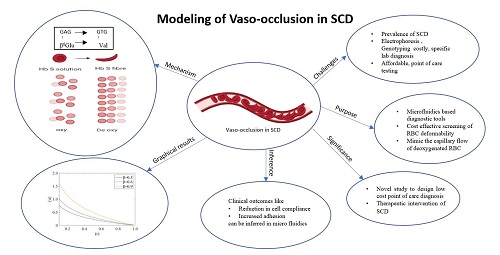|
Volume : XIV, Issue : V, June - 2024 A COMPARTMENTAL MATHEMATICAL MODEL OF SICKLE CELL DISEASE: TRANSMISSION DYNAMICS, EQUILIBRIUM ANALYSIS, AND INTERVENTION STRATEGIES FOR RARE GENETIC DISORDERS Puspanjali Kumari, None By : Laxmi Book Publication Abstract : Sickle Cell Disease (SCD) is a hereditary blood disorder caused by a genetic mutation in hemoglobin, leading to severe health complications, reduced life expectancy, and socio-economic challenges. Despite being classified as a rare disease globally, SCD remains a significant public health concern in certain regions, particularly where consanguinity and carrier prevalence are high. Keywords : Article : Cite This Article : Puspanjali Kumari, None(2024). A COMPARTMENTAL MATHEMATICAL MODEL OF SICKLE CELL DISEASE: TRANSMISSION DYNAMICS, EQUILIBRIUM ANALYSIS, AND INTERVENTION STRATEGIES FOR RARE GENETIC DISORDERS. Indian Streams Research Journal, Vol. XIV, Issue. V, http://isrj.org/UploadedData/11326.pdf References : - Nony, P., Kurbatova, P., Bajard, A., Malik, S., Castellan, C., Chabaud, S., ... & CRESim and Epi-CRESim study groups. (2014). A methodological framework for drug development in rare diseases. Orphanet journal of rare diseases, 9, 1-10.
- Pearson, I., Rothwell, B., Olaye, A., & Knight, C. (2018). Economic modelling considerations for rare diseases. Value in Health, 21(5), 515-524.
- de Mello, C. P. P., Rumsey, J., Slaughter, V., & Hickman, J. J. (2019). A human-on-a-chip approach to tackling rare diseases. Drug discovery today, 24(11), 2139-2151.
|
Article Post Production
No data exists for the row/column.
|